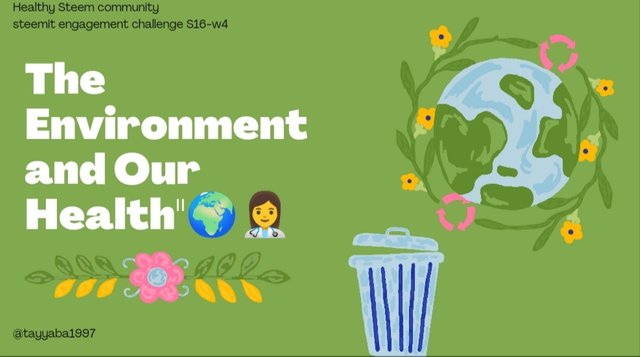Assalam.o.Alaikum all seemians and I warmly welcome to all of you in my healthy Steem community post. |
|---|

Edited in canva
What do you understand by the Word "Environment"?
The term "environment" typically refers to the surroundings or conditions in which a person, animal or plant operates. It encompasses both the natural world such as air, water, soil and ecosystemsand the built environment (including human-made structures, cities and infrastructure). It also includes factors like climate, biodiversity, pollution and human activities that impact the world around us.
How do our surroundings impact our well-being?
Our surroundings can significantly impact our well-being in several ways:
Physical Health: Clean air, water and access to green spaces promote physical health. Conversely exposure to pollution, toxins and environmental hazards can lead to health problems.

Source
Mental Health: Natural environments like parks and forests have been shown to reduce stress, anxiety and depression. Urban environments with green spaces can also provide mental health benefits.

Source
Social Well-being: The design of our surroundings can influence social interactions and community cohesion. Accessible public spaces encourage socialization and a sense of belonging.
Productivity: Work and living environments that are comfortable, well-designed and free from distractions can enhance productivity and focus.
Safety: Safe and secure surroundings contribute to a sense of well-being. This includes factors like low crime rates, well-lit streets and sturdy infrastructure.
Overall, our surroundings play a crucial role in shaping our quality of life and overall well-being.
What are some ways pollution, like air or water pollution, can affect our health?
Pollution, whether in the form of air or water pollution can have significant negative effects on our health:

Source
Respiratory Issues: Air pollution can exacerbate respiratory conditions such as asthma, bronchitis and chronic obstructive pulmonary disease (COPD).
Cardiovascular Problems: Exposure to air pollution has been linked to an increased risk of cardiovascular diseases such as heart attacks strokes and hypertension. Pollutants can contribute to the development of atherosclerosis (hardening of the arteries) and blood clot formation.
Cancer: Certain air pollutants, such as benzene and formaldehyde are classified as carcinogens and have been linked to various types of cancer including lung cancer.
Neurological Effects: Some air pollutants such as lead and mercury can adversely affect the nervous system leading to developmental issues in children and cognitive decline in adults.
Waterborne Diseases: Water pollution, particularly from untreated sewage, industrial waste and agricultural runoff can lead to the spread of waterborne diseases such as cholera typhoid and dysentery.
Contaminant Accumulation: Exposure to pollutants like heavy metals and persistent organic pollutants (POPs) through contaminated water or food sources can lead to their accumulation in the body over time causing long-term health effects.
Reproductive and Developmental Effects: Certain pollutants including endocrine-disrupting chemicals found in water sources can interfere with hormone function and lead to reproductive issues developmental delays and birth defects.
Overall, pollution poses a significant threat to public health and underscores the importance of environmental protection and regulation to mitigate its adverse effects.
What are some simple actions you take every day to promote environmental health?
There are several simple actions you can take every day to promote environmental health:
Reduce, Reuse, Recycle: Practice the 3Rs by reducing waste, reusing items when possible, and recycling materials like paper, plastic, glass, and metal.

Source
Conserve Water: Turn off taps when not in use, fix leaks promptly, and consider installing water-saving devices like low-flow showerheads and faucet aerators. Additionally, avoid wasteful practices like letting the water run while brushing teeth.
Conserve Energy: Turn off lights, appliances, and electronics when not in use. Use energy-efficient appliances and consider alternative energy sources such as solar or wind power if feasible.
Limit Single-Use Plastics: Avoid single-use plastics like plastic bags, straws, and water bottles. Instead, opt for reusable alternatives like cloth bags, stainless steel straws, and refillable water bottles.
Use Public Transportation, Carpool, or Bike: Reduce your carbon footprint by using public transportation, carpooling, biking, or walking whenever possible instead of driving alone.
Support Sustainable Practices: Choose products and companies that prioritize sustainability and environmental stewardship. Look for certifications like Fair Trade, USDA Organic, or Forest Stewardship Council (FSC) when shopping.
Minimize Food Waste: Plan meals, store food properly to prevent spoilage, and compost organic waste if possible. Buying locally produced food can also reduce the carbon footprint associated with transportation.
Plant Trees and Support Green Spaces: Participate in tree planting initiatives, support local parks, and advocate for the preservation of green spaces in your community.
Educate Yourself and Others: Stay informed about environmental issues and share your knowledge with friends, family, and colleagues. Encourage others to adopt environmentally friendly practices as well.
By incorporating these simple actions into your daily routine, you can contribute to the promotion of environmental health and sustainability.
How can education and awareness play a role in promoting environmental health?
Education and awareness are essential in promoting environmental health by fostering understanding of the interconnectedness between human activities and the environment. They can:
Inform Behavior Change: Educating individuals about sustainable practices, such as recycling, reducing energy consumption and conserving water, empowers them to make environmentally friendly choices in their daily lives.
Advocate Policy Change: Informed citizens are more likely to advocate for policies that protect the environment, such as stricter regulations on pollution and greenhouse gas emissions.
Encourage Conservation Efforts: Awareness campaigns can highlight the importance of preserving biodiversity protecting ecosystems and reducing habitat destruction, leading to increased conservation efforts.
Promote Sustainable Development: Education can promote the adoption of sustainable development practices ensuring that economic growth occurs in harmony with environmental preservation.
Raise Awareness about Environmental Issues: Increasing awareness about environmental issues such as climate change, deforestation, and pollution fosters a sense of urgency and collective responsibility to address these challenges.
Overall, education and awareness serve as catalysts for positive lllenvironmental action!kencouraging individuals, communities and governments to prioritize environmental health and sustainability.

Source
By concluding I invite my friends:
@sahmie
@mesola
@khursheedanwar
Thank you |
|---|
Best Regards @tayyaba1997 |
|---|


Upvoted! Thank you for supporting witness @jswit.
Downvoting a post can decrease pending rewards and make it less visible. Common reasons:
Submit
Thank you for the support, @jswit. Your engagement is appreciated. I'll ensure to continue supporting your initiatives. Let's work together to promote positive change and environmental awareness. Your contributions make a difference.
Downvoting a post can decrease pending rewards and make it less visible. Common reasons:
Submit
Upvoted. Thank You for sending some of your rewards to @null. It will make Steem stronger.
Downvoting a post can decrease pending rewards and make it less visible. Common reasons:
Submit
Your emphasis on the interconnectedness between human activities and the environment is commendable, as it highlights the importance of individual and collective responsibility in preserving our planet for future generations. Additionally, your practical suggestions for promoting environmental health through simple actions like recycling, conserving water and energy. Success on your entry.
Downvoting a post can decrease pending rewards and make it less visible. Common reasons:
Submit
Thank you for your thoughtful feedback and recognition of my efforts to promote environmental awareness and responsibility. I appreciate your encouragement and support. Let's continue working together to protect our planet and create a sustainable future for generations to come.
Downvoting a post can decrease pending rewards and make it less visible. Common reasons:
Submit
Making the environment polluted and spread litter is not good for habitat as well as it brings health related challenges also so there is a need to be very focused on taking care of environment so that we may play our role individually in spending healthy life in healthy environment.
Thanks for mentioning...Soon I would upload my entry too 😊
Downvoting a post can decrease pending rewards and make it less visible. Common reasons:
Submit
Thank you for highlighting the importance of environmental care and its impact on health. It's crucial for each of us to play our part in maintaining a clean and healthy environment for ourselves and future generations. Looking forward to seeing your entry. Best of luck! 😊
Downvoting a post can decrease pending rewards and make it less visible. Common reasons:
Submit
Pleasure to see your back response...
I have already dropped my entry
Downvoting a post can decrease pending rewards and make it less visible. Common reasons:
Submit